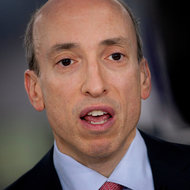 Scott Eells/Bloomberg NewsGary Gensler, chairman of the Commodity Futures Trading Commission.
Scott Eells/Bloomberg NewsGary Gensler, chairman of the Commodity Futures Trading Commission.
As Wall Street gears up for an overhaul of the $600 trillion derivatives business, big banks have grumbled that regulators failed to specify when the new policies will take effect.
After months of uncertainty, the issue reached a happy conclusion for the banks. Federal authorities now say the new regime will not kick in until Jan. 1, providing clarity and a brief — but important — extension to Wall Street.
Until now, the Commodity Futures Trading Commission had warned banks that they were likely to have to register as so-called swaps dealers by October. The agency’s chairman, Gary Gensler, also recently told Congress that “light will begin to shine on the swaps market,” a prominent area of derivatives trading, this fall.
But last week, Mr. Gensler expressed a more lenient timeline in a private meeting with Wall Street groups, according to people briefed on the meeting. His spokesman, Steve Adamske, confirmed on Wednesday that banks need not become registered swap dealers until January at the earliest.
It was the latest regulatory reprieve for Wall Street. Last week, the agency also granted an extension for rules that, for example, require firms to verify that their trading partners meet certain “eligibility standards.”
The Commodity Futures Trading Commission is planning to issue a formal document that spells out some of the agency’s due dates. The decision drew praise from Wall Street lawyers, whose clients have grown anxious about the unclear deadlines.
“In ending market uncertainty as to the registration date, the C.F.T.C. will provide a major service to the market,” said Annette L. Nazareth, a partner at the law firm Davis Polk and a former regulator at the Securities and Exchange Commission. “Entities planning to become swap dealers are working incredibly hard to implement a plethora of new C.F.T.C. requirements, and certainty as to the compliance timeline is a necessary prerequisite.”
The agency’s rules are a central component of the Dodd-Frank Act, which overhauled Wall Street regulation in the aftermath of the financial crisis. The law took particular aim at swaps trading, an opaque business that blew up in the crisis.
The swap-dealer designation, which applies only to firms that arrange more than $8 billion worth of swaps contracts annually, was among the most contentious aspects of the crackdown. The title carries requirements that banks, among other things, adopt internal risk management controls, bolster disclosures to trading partners and report their trades in real time.
But even the most sophisticated financial firms — and their high-priced lawyers — could not ferret out the registration deadline. The confusion stemmed from the vagaries of several overlapping rules. While the fine print of Dodd-Frank suggested that January was the likely deadline, some conflicting statements from the Commodity Futures Trading Commission confused the banks.
One Dodd-Frank provision implies, in effect, that banks must register by Oct. 12, when a rule that defines “swap” and other terms takes effect. But a separate provision requires only that banks start counting on that date to see if they hit the $8 billion threshold for swaps contracts in any given year. Big banks like Goldman Sachs and JPMorgan Chase are likely to pass that point in a matter of days.
At the end of the month in which a bank reaches the $8 billion mark, likely Oct. 31, banks then have an additional 60 days to sign up. That time frame will prompt most large banks to register by Jan. 1, while smaller firms might end up taking months to comply.
It is unclear if any banks will register early. Only one firm, Newedge, has opted to move ahead of the deadline.
Article source: http://dealbook.nytimes.com/2012/09/05/regulators-clarify-timing-of-new-derivatives-rules/?partner=rss&emc=rss
Speak Your Mind
You must be logged in to post a comment.